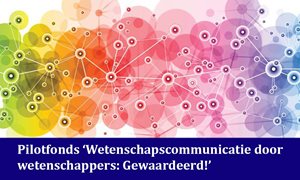 Dirk Lefeber has been appointed professor of Glycosylation Disorders, with effect from 1 July 2018. Lefeber leads the research group Glycosylation Disorders in Neurology.
Dirk Lefeber has been appointed professor of Glycosylation Disorders, with effect from 1 July 2018. Lefeber leads the research group Glycosylation Disorders in Neurology.
Glycosylation is a process by which proteins are modified with different sugars. Variations in this process occur with almost every disease. Although the biological language of our DNA and proteins is already well understood, this is certainly not the case for protein glycosylation.
To gain more insight into this, Dirk Lefeber investigates patients with hereditary metabolic disorders at Radboudumc. Amongst his most important findings is the discovery of several new molecular routes for the incorporation of sugars into the muscle. Understanding such abnormalities has already led to improved diagnostics and new therapies in patient care.
Vidi
Dirk Lefeber (Elst, 1974) studied chemistry at Utrecht University and received his MSc, with honours, in 1997. In 2001, he obtained his PhD on synthetic carbohydrate vaccines against pneumococcal bacteria. He worked as a postdoctoral researcher in infectiology at the University Medical Center Utrecht and subsequently took a staff position in the department of Neurology and the Translational Metabolic Laboratory in Nijmegen. After undertaking a four-year training programme as a laboratory specialist clinical genetics, Lefeber built a research group in the field of Glycosylation Disorders.
He is also leader of the Radboudumc Expertise Center for Disorders of Glycosylation. Lefeber has received various national and international prizes, including a Vidi grant from the NWO.
Proteins
As professor of Glycosylation Disorders in Neurology, he will focus on the mechanisms of protein glycosylation in (hereditary) neurological diseases. The Lefeber group is developing new technologies to study the glycosylation of proteins, and will use these widely to improve medical science. Through his research, he wants to gain new insights into the process of protein glycosylation in disease, and translate these into improved person-oriented care.
Related news items

Grants for science communication at Radboudumc
22 April 2021 Scientists at the Radboudumc have received two KNAW grants, each worth 10,000 euros, for science communication. With the new fund, KNAW underlines importance of making science accessible. go to page
UMD Catalist grant for Mohammad Alsady and Federica Conte
24 June 2020They received this award to explore the potential of hiPS-derived skeletal muscle cells as model to investigate muscular pathophysiologic mechanisms in phosphoglucomutase I deficiency.
go to page
Bas Bloem elected as new member of the KNAW
30 April 2020 Bas Bloem is an expert in Parkinson's disease. He is also a healthcare innovator, focused on the integration of scientific research and its clinical applications. We congratulate Bas with this election. go to page
Towards molecular therapies for Myotonic Dystrophy
1 October 2019ReCognitION, a new 1.3 M€ European project under the leadership of Peter-Bram ‘t Hoen, Baziel van Engelen and Jeffrey Glennon, was kicked-off in Gent.
go to page
Useful new test for Parkinson's disease
28 March 2019 Diagnosing Parkinson's is not easy. In particular in the early stages, it can be difficult to distinguish Parkinson's from a group of other disorders that at first sight look identical. go to page
